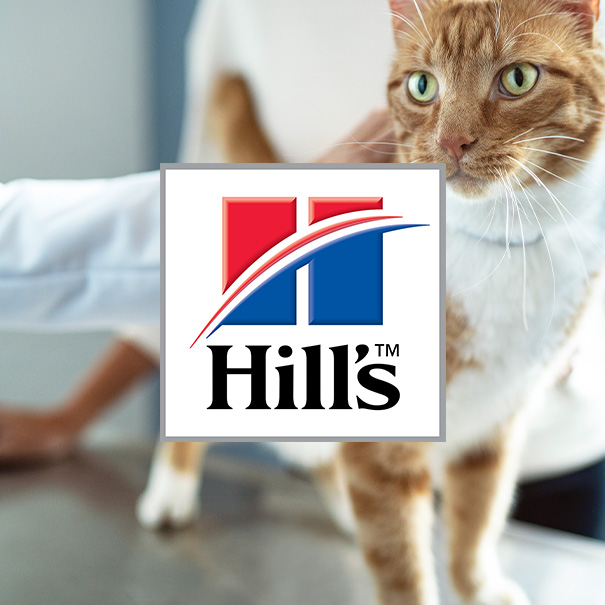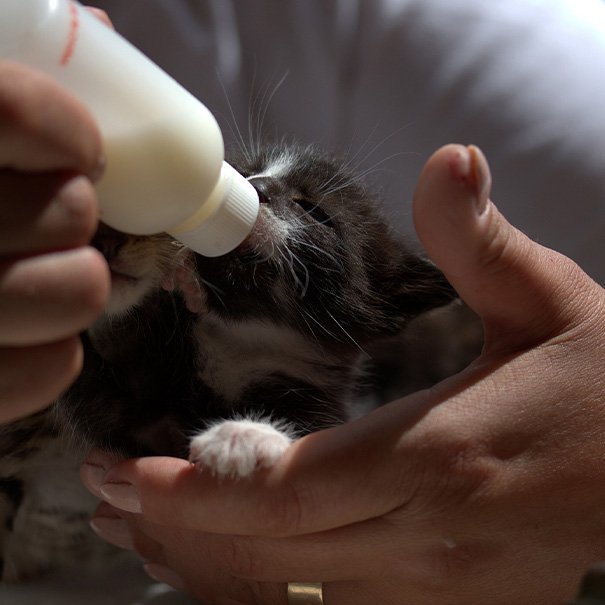Balanced and precise Nutrition
Kitten needs balanced and precise nutrition with just the right amounts of protein, fats, minerals and vitamins for its optimal body growth and keeping them naturally fit to fight against common infections. Use Hills Science Plan super premium kitten foods for quality results.
Grooming
Kittens with smooth shiny coats will grow up having short hair and need little or no grooming. Those with fuzzy hair develop longer coats requiring more attention. Although cats clean themselves, there are difficult-to-reach areas where hair mats tend to accumulate. Comb out little tangles before they become big hair mats. Getting them out later will be a tough project for both of you. Be gentle. If mats have already begun to develop, try doing just a little every day.
Play Toys
Kittens love to play. Provide harmless outlets for all that energy by supplying toys that are safe. Select toys too large to be swallowed but small enough to bat around. A ping pong ball, crumpled wax paper or a toilet paper tube are all excellent choices
Aggressive play
Your kitten must always associate your hands with gentleness and kind attention. Never encourage biting or aggressive play by batting at kittens with your hands. When it comes time for grooming or administering medications, your cat must know that hands are not for biting and realize that you expect cooperation.
Scratching Post
Kittens need a place to scratch and sharpen their claws. This is such a strong instinct and so necessary for normal development, that unless there is a satisfactory alternative, no amount of scolding will keep your furniture from being torn apart. Buy or make a good scratching post. Old carpeting tacked to any sturdy object will do just fine.
Discouraging bad behavior
Sometimes scratching become a big menace so when “no” doesn’t work, the best alternative is a squirt bottle. Chasing your kitten, spanking, or throwing things may eventually accomplish your goal, but does not promote the warm kitty-person relationship you would like to encourage. Instead, get a spray bottle like those sold for misting house plants. When you adjust it to a single stream, you can probably get pretty good distance and accuracy. Now, when kitten is scratching at the couch, a sudden jet of water provides immediate and effective discouragement without being associated directly with you. You may need to get three or four sprayers and keep them in strategic locations throughout the house.
Nail trimming
Active cats and kittens keep their nails in condition by scratching. Nail trimming is seldom required, and because the nails grow so rapidly, trimming is not a useful way to avoid furniture damage.
Oral and dental care
Taking care of your kitten’s teeth now will prevent a lot of problems later on in his life. As they age, nearly all cats have problems with their teeth, including gum disease and cavities, just like people. Feed dry food. It helps keep the teeth clean and having something hard enough to chew keeps the teeth and gums healthier. If possible brush their tooth regularly.
Traveling with Kitty
Because they have a tendency to climb all over the driver or hide under the brake pedal, cats should be transported in a secure enclosure. Cats feel safer in a carrier, and however much they may complain about the car ride, it would be worse if they were loose. When you reach your destination and open the door, unrestrained cats sometimes jump out and run away.
Periodical Vet Checkup
Your vet will do periodical vaccination and deworming to safeguard him against lethal pathogens.
Cats are strict carnivores that rely on nutrients in animal tissues to meet their specific and unique nutritional requirements. In their natural habitat, cats consume prey high in protein with moderate amounts of fat and small amounts of carbohydrates. Thus, they are metabolically adapted for higher
metabolism of proteins and lower utilization of carbohydrates than dogs or other omnivores. Although cats can use carbohydrates as a source of metabolic energy, they have limited ability to spare protein utilization by using carbohydrates instead. Therefore, their diet should be comprised of proteins, fats, carbohydrates, vitamins, minerals and water in the correct proportions.
Proteins
Comprised of 23 different amino acids, proteins are often called the “building blocks” of the tissues. The kitten’s body can manufacture 12 of these amino acids. The other 11 amino acids, however, must come from dietary meat and plant sources and are called the “essential amino acids”.
Taurine, an amino acid present only in animal tissues, is one of the essential amino acids for cats needed to sustain normal cardiovascular, reproductive, and visual performance. Kittens require a dietary source of taurine because they cannot synthesize enough taurine from dietary precursors. Arginine is essential in the feline diet to promote detoxification of nitrogenous waste products.
Fats
Fats are used to supply energy, essential fatty acids and promote absorption of fat-soluble Vitamins A, D, E and K. In addition, fats make a diet more palatable to a kitten and help to maintain a healthy skin and haircoat. Compared to dogs, kittens require dietary sources of both linoleic acid and arachidonic acid. The requirement of both fatty acids arises from kittens’ inability to synthesize arachidonic acid from linoleic acid.
Carbohydrates
Carbohydrates provide energy and are made up of sugars, starches and cellulose (fiber). Carbohydrates are supplied in the diet from plant sources such as grains and vegetables. Despite the kitten’s adaptation to a low-carbohydrate diet, they are very efficient in starch and simple sugar
Vitamins Vitamins are necessary for many of the body’s chemical reactions. Fat-soluble Vitamins A, D, E and K need fat in the diet to be absorbed by the body. Kittens are incapable of converting beta-carotene from vegetables to Vitamin A. Therefore kittens require preformed Vitamin A, which is found only in animal tissues. Kittens also need a diet fortified with B vitamins thiamin and niacin. Vitamin C is not needed in the feline diet because kittens can make it themselves. “Complete” and “Balanced” commercial kitten foods don’t need additional vitamin supplementation.
Minerals
Minerals are needed by the body for structural building and chemical reactions. Like vitamins, minerals are supplied in the correct proportions in “Complete” and “Balanced” commercial kitten foods. Damage can be done by over supplementation. This is particularly true for calcium and phosphorus, because the proportions of these two minerals must be supplied to the kitten in the proper ratio for nutritional health.
Water
Water is the most important nutrient for all animals. Since cats do not have a strong thirst drive compared to other mammals, it is critical to provide a source of clean and fresh water in various locations at all times. Canned kitten food has a water content of at least 75 percent, so it is a good
dietary source of water.
Feeding a Balanced Diet
Kittens require a diet that regularly includes proteins, fats, carbohydrates, vitamins, minerals and water for proper nutrition. Of equal importance is the balance of these ingredients in the diet. A commercial kitten food is the most convenient method of ensuring a kitten receives these ingredients in correct proportions.
Choosing a Commercial Cat Food
Pet food manufacturers have developed foods that may safely be given as a kitten’s sole diet without supplementation. Such foods can be identified by the words “complete and balanced nutrition” on the label. These claims are regulated by federal and state agencies. The product may be formulated to meet the expected nutritional needs of cats in a given stage of life or the product can be chemically analyzed to be sure all the expected nutrients are present. If these methods are used to justify that claim of “complete and balanced” nutrition, the kitten food label should include a statement that the nutritional adequacy is based on a comparison to known nutritional standards. Look for these words on
such products: “Meets the nutritional requirements of kittens established by the American Association of Feed Control Officials (AAFCO).”



